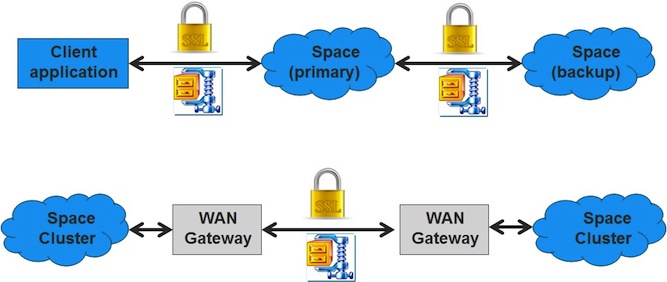Securing the Transport Layer
XAP provides a generic network filter that also provides SSL support, through an SSL communication filter.

XAP provides two types of communication filter:
- Stream-based filter - for a protocol like ZIP. This type of filter does not support a handshake phase.
- Block-based filter - for encryption network filters. These filters do support a handshake phase.
For now, XAP supports only one communication filter, and this filter is applied to all the connections in the JVM.
Usage
The way to load and enable the communication filter, is by setting the system property com.gs.lrmi.filter.factory. The value should be the communication filter factory class name.
For example, to use an SSL communication filter, run XAP with:
-Dcom.gs.lrmi.filter.factory=com.gigaspaces.lrmi.nio.filters.SSLFilterFactory
Default SSLFilterFactory
Since some types of communication filters are not symmetric regarding the client and server, the class SSLFilterFactory has 2 methods: one to create the communication filter for the client side, and the other for the server side.
public IOFilter createClientFilter() throws Exception;
public IOFilter createServerFilter() throws Exception;
If the communication filter needs its own parameters, it can acquire them by directly reading system properties. For example, the supplied SSLFilter needs to get the keystore file, and the password to this file.
It uses the following system properties to get them:
-Dcom.gs.lrmi.filter.security.keystore=keystore.ks
-Dcom.gs.lrmi.filter.security.password=password
The keystore file is loaded from somewhere in the classpath.
The provided SSLFilter uses keystore type JKS, with key management method SunX509.
Please refer to the JavaDocs for more details about the reference classes:
Code snippet of the space server.
public class SSLServer {
public static void main(String [] args) throws Exception{
EmbeddedSpaceConfigurer configurer = new EmbeddedSpaceConfigurer("SSLSpace").
lookupGroups("ssl_example_group");
GigaSpace gigaSpace = new GigaSpaceConfigurer(configurer).gigaSpace();
}
}
Code snippet of the space client.
public class SSLClient {
public static void main(String [] args) throws Exception{
UrlSpaceConfigurer configurer =
new UrlSpaceConfigurer("jini://localhost/*/SSLSpace).
lookupGroups("ssl_example_group");
GigaSpace remoteSpace = new GigaSpaceConfigurer(configurer).gigaSpace();
AnEntry entry = new AnEntry();
entry.key = "first";
entry.payload = "first value";
remoteSpace.write(entry);
AnEntry value = remoteSpace.read(new AnEntry());
System.out.println(value.payload);
}
public static class AnEntry implements Entry{
private static final long serialVersionUID = 1L;
public AnEntry() {
}
public String key;
public String payload;
}
}
As you can see, until now there is nothing special in the code – it is the same code as if the SSL was not used. However, when you wish to run this code with SSL encryption, you should run it with the following system properties (both server and client), and have the keystore anywhere in the classpath (both server and client).
-Dcom.gs.lrmi.filter.factory=com.gigaspaces.lrmi.nio.filters.SSLFilterFactory
-Dcom.gs.lrmi.filter.security.keystore=keystore.ks
-Dcom.gs.lrmi.filter.security.password=password
You can find an example of using SSLFilterFactory with self signed certs here.
Alternatively if you do not need authentication and just wish to encrypt the data you can omit the keystore and the password and the server will generate the ssl keys on the fly.
-Dcom.gs.lrmi.filter.factory=com.gigaspaces.lrmi.nio.filters.SSLFilterFactory
Choosing the encryption protocol
It is also possible to select the encryption protocol (TLSv1.1, TLSv1.2 etc) by setting the com.gs.lrmi.filter.security.protocol system property to the required protocol.
In case this property is not set XAP will use the generic TLS protocol.
With production environment you should have the SSLFilterFactory password (or any other secured user access information) protected by passing its value at the deploy time into the pu.xml (where the actual property using a variable) or at the start-up time as an argument to a wrapper script starting the GigaSpaces agent and not place such secured data on file.
The indication that SSL is used is the message:
Communication Filters Information:
CommunicationFilterFactory: com.gigaspaces.lrmi.nio.filters.SSLFilterFactory
